Dentures – Marysville, OH
The Perfect Prosthetic For You!
If you’re missing many (or all) of your teeth, that can seriously affect how you feel going through life. You may find yourself struggling to talk, eat, and smile in the way that you used to. Thankfully, for patients around Marysville, OH, our team at Northwest Family Dental can craft the perfect prosthetic for you!
Dentures can radically change how you look and feel about yourself, so what are you waiting for? Give us a call today and we’ll welcome you in for a consultation.
Why Choose Northwest Family Dental For Dentures?
- Will Work With You To Maximize Your Insurance Benefits
- Friendly, Experienced Dental Team Focused On Your Happiness
- High-Quality Materials For a Durable Prosthetic
Who Is a Good Candidate for Dentures?

Virtually anyone who has suffered moderate to severe tooth loss can qualify for dentures. Of course, you will need to attend a consultation with our team to be sure. We will evaluate your circumstances and recommend the best path forward. If you are not currently a candidate for dentures, you may become one after some preliminary treatments. Our team wants you to enjoy a healthy and complete smile, so we will do everything in our power to move you in that direction.
Effects of Missing Teeth

Due to genetics, physical trauma, gum disease, decay, or other factors, millions of individuals have suffered some degree of tooth loss. Missing teeth can stop you from eating your favorite foods, talking properly, and even smiling as much as you would like to. Plus, your facial appearance can be negatively affected because your cheeks may not have the support they need. Over time, the effects of missing teeth can have a great negative impact on your quality of life and your health. Dentures can help to address many of the issues that come with an incomplete smile.
What Qualifies You for Dentures?

Dentures are ideal for patients who are missing most or all of their teeth — if you’re missing just one or two, other replacement options may be the best thing for you. Dentures also rely on your gums for support, so having healthy gums is fairly important to your candidacy for the prosthetic. Overall, most patients facing moderate to severe tooth loss are excellent candidates for dentures!
There are a few different types of dentures, and we will recommend the one that we believe best fits your unique situation.
Alternative Tooth Replacement Options
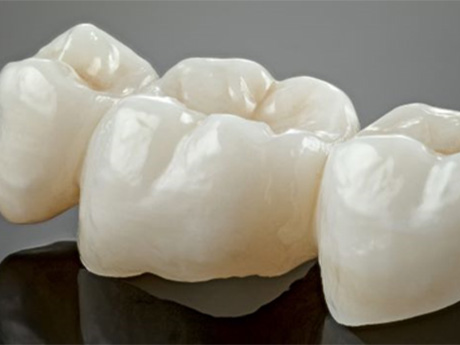
If dentures are not suitable for you, you may be a candidate for other forms of tooth replacement. For example, we might recommend that you receive:
- A fixed bridge. A fixed dental bridge can replace 1 – 3 missing teeth in a row. It relies on the remaining healthy teeth for support and has the potential to last for a decade or longer.
- Dental implants. Implants are prosthetic tooth roots. They can provide an incredibly strong base of support for a crown, bridge, or denture. We always recommend implants for any individual who meets the criteria for this procedure. They tend to last much longer than traditional dentures and offer numerous other benefits.
Types of Dentures

There are a few different kinds of dentures, and each of them is better suited to some people than others. We’ll talk with you at a consultation about which kind of dentures are best for you, and what you can expect the process of getting dentures to look like.
Partial Dentures

Even if you aren’t missing all of your teeth, having large gaps in your smile can dramatically impact both your confidence and your ability to chew your food completely.
Partial dentures are designed to take the place of several teeth at once. They’re made up of a long string of acrylic teeth with metal hooks on either side of them, allowing them to slip onto your natural teeth for support.
Full Dentures

Full dentures, as you might imagine, are designed for people who are missing all of their teeth on a single arch. That means that you don’t have any teeth to hook onto, so the dentures have to be specially designed to fit snugly onto your gums via suction.
We’ll make a model of your gums, then design the base of these dentures to match them perfectly so that they can comfortably and securely stay in your mouth.
Implant Dentures

While full dentures can be strong and stable, there’s only so much they can do with suction alone. If you’re looking for something even sturdier, implant dentures can help.
This is a full set of dentures attached to dental implants, which are metal posts surgically placed in the jaw. This offers them a level of support that traditional dentures don’t have, leading to fewer denture sores and a stronger overall bite.
How Dentures Are Made
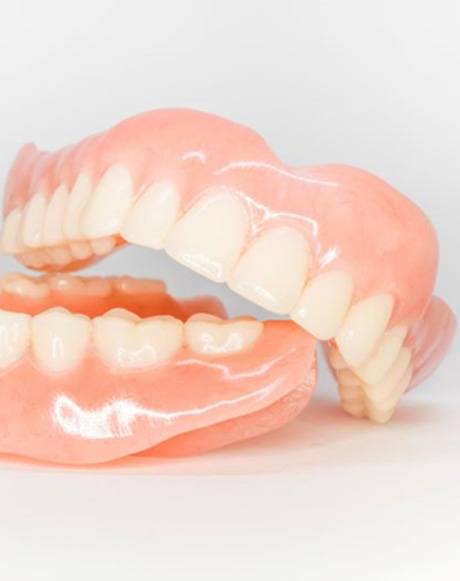
After you decide to commit to dentures, you may have questions about the process in front of you. What are dentures made out of? How are they created? Understanding the answers to such questions may enhance your appreciation for your new smile. Here is a basic overview of how we will work to give you a strong and beautiful set of teeth:
What Are Dentures Made Of?
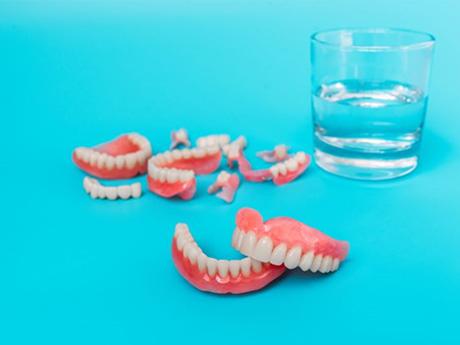
Dentures usually have two parts:
- The base of dentures is the gum-colored portion of the prosthetic that will adhere to your gums, either through natural suction or other means. Although the base can be made of different materials, most dentures feature acrylic because it is highly customizable and can be colored to blend in beautifully with a patient’s natural features. In some cases, nylon is used instead of acrylic.
- The teeth of dentures are usually made of acrylic resin or porcelain. Both options have a natural appearance. Porcelain is usually used for full sets of dentures, but acrylic is often favored for partial dentures because it is gentler on natural teeth.
The Denture Creation Process
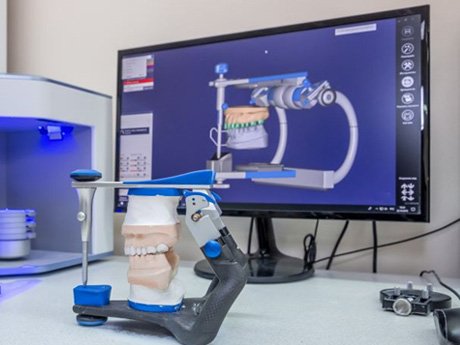
The denture creation process is customized for each patient. It usually goes something like this:
- Our team will take detailed impressions of your gums. We usually do this via the use of a thick paste that you have to bite on until it forms to the shape of your mouth. We may also take some measurements of your gums. This data is essential for designing a comfortable, well-fitting denture.
- We will send a cast of your mouth to a trustworthy local lab, which will create a wax version of your gumline. A mechanical device called an articulator will then attach the new teeth to the wax model. The model may then be sent back to us so we can verify its fit.
- The lab will finish creating your denture, and you will attend a final fitting before you can go off and start adapting to your new smile!
The denture creation process may be as short as three weeks or as long as a few months. It all depends on the specific details of your case.
Adjusting to Your New Dentures

When you first get your new prosthetic, you may experience some discomfort for a few weeks (or longer). Practice speaking and eating so you can get used to your denture. Be sure to stick to soft foods for a while. Hopefully, your denture will soon feel like a natural extension of your body! If you experience prolonged or severe discomfort, or you have other struggles, be sure to reach out to us. We will do all we can to assist you.
The Benefits of Dentures

Our team works hard to ensure our dentures fit our patients’ mouths perfectly so that they not only look their best but are also strong enough to help them eat a nutritious diet. Furthermore, these prosthetics are also some of the most convenient methods of tooth replacement and can last many years. They’re inexpensive and easy to clean, making them some of the biggest bangs for your buck that you can get. Read on to learn about some of the many benefits you can enjoy with dentures.
Psychological Benefits

Missing even a single tooth can cause someone to be self-conscious about their appearance. They also may become less likely to want to engage in social activities, which can end up increasing levels of anxiety. By replacing missing teeth with dentures, you can feel more comfortable about showing your smile, which can then help boost your confidence in the long run. You also won’t have to worry as much about any anxieties regarding your speech, appearance, chewing, etc.
Clearer Enunciation

To speak clearly, we typically require all of our teeth to be in place. This is because we often place our tongues and lips against our pearly whites to enunciate certain sounds and words. Without teeth, conversing can become extremely challenging and anxiety-inducing. With dentures, you can easily regain your full smile, allowing you to speak normally again. The adjustment period does take some time, but practice and repetition will take you a long way.
Improves Nutrition

Many healthy foods have a tough texture, which makes them more difficult to chew if you don’t have all of your teeth. These include fruits, vegetables, and lean proteins. Being unable to eat properly can lead to issues like malnutrition and indigestion. Dentures can provide the full bite you need to digest your food properly, allowing you to also expand your diet and receive the essential minerals you need to improve your gum and jawbone health.
Preserves Oral Health

Do you still have some of your natural teeth? If so, they could be at risk of moving out of place if there aren’t any nearby to help support them. By wearing dentures, you can help prevent dental shifting as well as potential future tooth loss. Your prosthetics will also help distribute the pressures of chewing more evenly throughout your bite, preventing wear and tear of your natural teeth.
Expands Opportunities

As your smile is the first thing most people will notice about you, having a full set of teeth is incredibly important for first impressions. Whether you’re preparing for a job interview or a first date, improving your appearance can boost your opportunities. With dentures, you’ll be able to smile confidently, which can then show others how you carry yourself. This can end up helping you in both your social and professional life.
Understanding the Cost of Dentures

Struggling with tooth loss can be an incredibly difficult experience, and dentures are one of the most reliable ways to address this. However, you may be wondering how much you’ll expect to pay for this treatment. Due to everyone’s unique smile, the overall cost of dentures can vary from person to person. That’s why you’ll need to schedule an initial consultation with our team to get a proper price estimate. Until you visit us, here are a few things you’ll need to consider when it comes to the cost of dentures!
Factors That Affect the Cost of Dentures

Several aspects can influence the price of dentures, including:
- Any preliminary procedures necessary (such as tooth extractions, periodontal therapy, etc.)
- The number of teeth that need to be replaced
- The kind of acrylic used to construct the base of the denture
- Materials used to fabricate your artificial teeth (like acrylic and porcelain
Those who are working with a budget may sometimes consider opting for a cheaper denture product. While tempting, these prosthetics can end up causing more problems. Not only will the materials used be lower-quality, meaning they can become damaged or warped more easily, but you’ll likely need to get replacements much sooner, costing you more money in the long run. With professional dentures, you’ll expect to enjoy a reliable, lifelike, and high-quality product for renewing your smile.
Are Implant Dentures More Expensive?
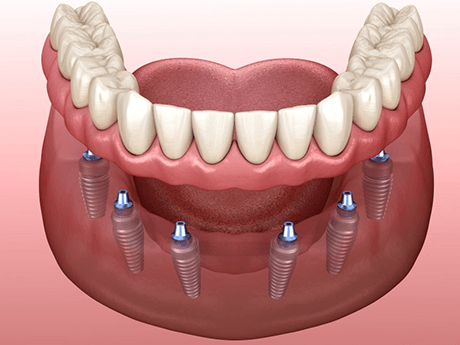
While implant dentures are more costly than traditional ones, there’s a good reason for this. These prosthetics involve oral surgery as well as the placing of dental implants in the jawbone. This procedure is more invasive, but the results are incredibly worthwhile. On top of rebuilding your missing teeth, the metal posts will also help preserve your facial shape, jawbone, and any remaining teeth in your mouth. The result: a much stronger bite that can last decades to a lifetime with proper care!
Does Dental Insurance Cover Dentures?

Dentures are meant to restore lost teeth and renew your bite, so they’re typically covered by dental insurance. While the amount can vary from patient to patient, the usual coverage can often be around 50-80% of the total cost of treatment. That said, no two policies will look the same, so you’ll want to consult your provider before going forward with your treatment, that way you’re aware of the details of your plan. If you need help navigating your policy and making the most of your benefits, our knowledgeable team is also here to help.
Other Options for Making Dentures Affordable

Our practice understands that not everyone has dental insurance. For this reason, we’re proud to offer various alternative methods for making your treatments more manageable for you. Our team has in-house membership plans that, with either a monthly or annual fee, can provide significant discounts on multiple procedures, including dentures. We’re also partnered with CareCredit and Cherry—third-party financiers that can help split the price of dental care into monthly payments that usually come with little-to-zero interest!
Dentures Aftercare

Maintaining your dentures so that they will last for many years requires time, patience, and diligence. Your new smile deserves careful attention, especially since using the wrong products or wearing them for prolonged periods can lead to serious issues that hinder the longevity of these teeth. To find out what you can do to ensure that your smile looks great and lasts as long as possible, keep reading.
Removable Dentures

Remove After Eating
It’s important that you remove your dentures after eating because of how easy it is for food to become trapped underneath your new teeth. These prosthetics can experience a build-up of food particles and other debris that can lead to gum disease if not cleaned regularly. By removing your teeth after completing a meal, you can thoroughly clean them, ensuring that no bacteria remain behind to irritate your gums.
Clean Your Restoration
Keeping your dentures clean is necessary for greater longevity. You can use a soft-bristled toothbrush and clear soap to actively remove any stains that may try to form on the outer layer of your teeth. You do not want to use abrasive toothpaste, as this can scratch your prosthetics and damage them over time.
Keep Your Dentures Safe
Whether you want to play sports or are simply preparing to clean your dentures before bed, you’ll need to make sure they remain protected. This includes wearing appropriate mouth protection during a game, placing a towel in the basin of your sink to avoid an accidental slip that causes them to break, and keeping them in a safe and secure place where little hands and pets cannot reach.
Remove Dentures When You Sleep
You might not find it necessary to take out your dentures before going to sleep, but this is important for the health of your gums and bone. Because you wear your prosthetic teeth all day, every day, nighttime is ideal to let them soak and undergo a thorough cleaning. While your dentures remain out of your mouth while you sleep, this gives your bone and gums a chance to regain valuable nutrients that are lost throughout the day. Also, these areas can breathe and rest from the pressures of denture wear.
Notice Changes
Should you notice any changes, which you likely will, make sure you do not delay in scheduling an appointment with your dentist. It is not uncommon for dentures to no longer fit properly once your jawbone begins to change shape over time. When this happens, your dentist will perform a relinement or suggest a new denture be created.
All-On-4 Dentures
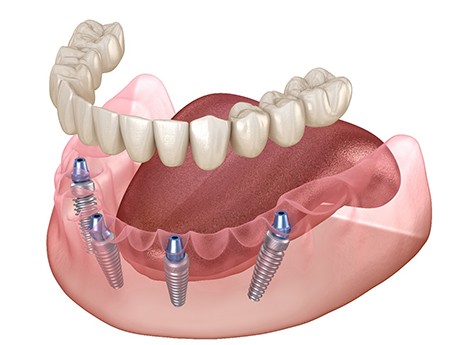
All-On-4 dentures are vastly different than traditional ones because of their permanence inside the mouth. Held in place by titanium implant posts, you can opt for a removable or fixed denture. Cleaning your teeth remains just as important though, as gum disease is still a potential problem that you must prevent. This means you’ll be required to brush and floss underneath your prosthetic so that bacteria and harmful debris do not build up over time.
Denture FAQs

Dentures can represent a massive quality of life shift for patients missing most of their teeth, but wearing your prosthetic every day can also take some getting used to. Approaching any kind of radical life change like this can leave patients with questions, and we’ll be happy to answer any that you might have.
Until we can talk to you in person, here’s a quick FAQ that can tell you a bit more about what wearing dentures is like and what they can do for you.
Do I Have To Remove Teeth In Order to Get Dentures?
We really wouldn’t recommend extracting otherwise healthy teeth in order to make room for your dentures. As you may already be aware, the process of getting teeth removed isn’t the easiest, which is why we would really only do it when absolutely necessary. Even if you have a tooth in an area that seems inconvenient for your dentures, partial dentures are stable enough that we can easily construct them despite you having those teeth.
That said, if all of your teeth on a given arch are infected, it may be more economical to extract them and replace them with dentures that cover each of them with crowns. We’ll be happy to talk to you about whether that could be the best option for you.
Do Dentures Make It Hard to Talk?
If you’re used to talking with your natural teeth, or even without any teeth at all, suddenly getting a new set of dentures can take some getting used to. However, as with anything, it’ll get easier the more you practice.
Some people experience a kind of lisp at first, so if you notice this happening, focus on repeating the words you have the most trouble with until saying them is second nature.
What Can’t You Eat with Dentures?
While dentures can be pretty strong, they’re mostly held in place via suction to the gums. As a result, there are some foods that you may want to steer clear of for the sake of your prosthetic.
For one, sticky and gummy foods can potentially pull your prosthetic out of place, which allows food to get trapped under your dentures and irritate the gums. There are also nuts and popcorn that are often too hard for the acrylic of your prosthetic.
Finally, chewier meats like steak and pork chops can be a little bit difficult to eat with your dentures and put undue pressure on the gums.
Will Dentures Change the Shape of My Face?
Your teeth act like the poles in a tent, propping up the cheeks and adding structure to the face. Without them your face may have a sunken appearance, leading to premature wrinkles and an older appearance.
If you get a set of well-fitting dentures, they’ll be able to improve the way you look with your mouth both open and closed.

